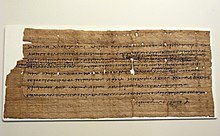Zenon of Kaunos
Zenon of Kaunos | |
|---|---|
Ζήνων | |
| Born | |
| Nationality | Greek |
| Other names | Zeno |
| Occupation(s) | Financial private secretary and scribe |
| Era | Hellenistic period |
| Employer | Apollonius |
| Organization | Ptolemaic Kingdom of Egypt |
| Known for | Zenon Papyri |
| Father | Agreophon |
Zenon or Zeno (Greek: Ζήνων; 3rd century BC), son of Agreophon, was a public official in Ptolemaic Egypt around the 250s-230s BC. He is known from a cache of his papyrus documents which was discovered by archaeologists in the Nile Valley in 1914.
Biography
Zeno was a native of the Greek town of Kaunos in Caria in southwestern Asia Minor. He moved to the town of Philadelphia in Egypt, a busy market town that had been founded on the edge of the Faiyum by Ptolemy II Philadelphus in honour of his sister Arsinoe II. From the 3rd century BC until the 5th century CE, Philadelphia was a thriving settlement that relied on agriculture for its economic success.[1][2] At Philadelphia, Zeno became a private secretary to Apollonius, the finance minister to Ptolemy II Philadelphus and Ptolemy III Euergetes.[3]
Drimylus and Dionysius, two Greek employees under Zeno, were reported to him for selling women as sex-slaves.[4]
The Zenon Papyri

During the winter of 1914–1915, Egyptian peasants were digging near the modern settlement of Kom el-Kharaba for sebakh (decayed mudbricks that were often plundered from ancient sites as they could be used as fertiliser). There they uncovered a cache of over 2,000 papyrus documents. Upon examination by Egyptologists, they were found to be records written by Zeno in Greek and Demotic, and the site (whose precise location is now unknown) was identified as the location of the ancient town of Philadelphia.[2] Most of the papyri, now referred to as the Zenon Archive or the Zenon Papyri,[5] were edited and published by the British papyrologists Campbell Cowan Edgar and Arthur Surridge Hunt.[6][7][8]
The Zenon Archive has since been divided among several museum collections and academic institutions around the world, and papyri are now held in the collections of the University of Michigan, Columbia University, the Società Italiana per la Ricerca dei Papiri Greci e Latini in Egitto, the British Museum in London and the Egyptian Museum in Cairo.[9] A substantial part of the Zenon Papyri are now online and grammatically tagged at the Perseus Project hosted at Tufts University.[10]
References
- ^ "Philadelpheia (Gharabet el-Gerza)". www.trismegistos.org. TM Places. Retrieved 20 April 2021.
- ^ a b "Where do the Zenon Papyri come from?". apps.lib.umich.edu. University of Michigan. Retrieved 20 April 2021.
- ^ "Who was Zenon". apps.lib.umich.edu. University of Michigan. Retrieved 20 April 2021.
- ^ PSI 4.406 - attalus.org.
- ^ About the Zenon Papyri - University of Michigan.
- ^ Bierbrier 2012, p. 171.
- ^ Guérud 1939, pp. 3–10.
- ^ "Edgar plot". Rectory Lane Cemetery. Friends of St Peter's Berkhamsted. 2021. Archived from the original on 19 April 2021. Retrieved 19 April 2021.
- ^ "Where are the Zenon Papyri now?". apps.lib.umich.edu. University of Michigan. Retrieved 20 April 2021.
- ^ P.Cair.Zen., Zenon Papyri, Catalogue général des antiquités égyptiennes du Musée du Caire
Sources
- Bierbrier, M.L. (2012). Who was who in Egyptology. Egypt Exploration Society. ISBN 9780856982071.
- Guérud, O. (1939). "Campbell Cowan Edgar (1870-1938)". Annales du Service des Antiquités de l'Égypte, Service des Antiquités de l'Égypte. Cairo.
{{cite book}}: CS1 maint: location missing publisher (link)
Further reading
- Edgar, Campbell Cowan (1925). Catalogue général des antiquités égyptiennes du Musée du Caire: Zenon Papyri I (in French). Imprimerie de l'Institut français d'archéologie orientale. Retrieved 8 Jan 2023.
- Edgar, Campbell Cowan (1926). Catalogue général des antiquités égyptiennes du Musée du Caire: Zenon Papyri II (in French). Imprimerie de l'Institut français d'archéologie orientale. Retrieved 8 Jan 2023.
- Edgar, Campbell Cowan (1928). Catalogue général des antiquités égyptiennes du Musée du Caire: Zenon Papyri III (in French). Imprimerie de l'Institut français d'archéologie orientale. Retrieved 8 Jan 2023.
- Edgar, Campbell Cowan (1931). Catalogue général des antiquités égyptiennes du Musée du Caire: Zenon Papyri IV (in French). Imprimerie de l'Institut français d'archéologie orientale. Retrieved 8 Jan 2023.
- Edgar, Campbell Cowan (1940). Catalogue général des antiquités égyptiennes du Musée du Caire: Zenon Papyri V (in French). Imprimerie de l'Institut français d'archéologie orientale. Retrieved 8 Jan 2023.
- Grier, Elizabeth (1932). "Accounting in the Zenon Papyri". Classical Philology. 27 (3): 222–231. ISSN 0009-837X.
- Hacham, Noah; Ilan, Tal, eds. (2020). Corpus Papyrorum Judaicarum, Volume 4: The Ptolemaic Period (323 BCE–30 BCE). De Gruyter & Magnes. pp. 150–155. doi:10.1515/9783110674521. Retrieved 8 Jan 2023.
External links
- Letters from the Zenon Archive in English translation
